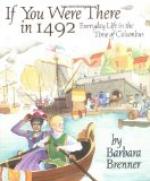An Indian reception.
When Anacaona, the Queen of Xaragua, had received the admiral’s brother, Don Bartolome, on a former occasion, the Spaniards affirmed her to be a wise woman, of good manners, and pleasant address; and she is said to have earnestly entreated her brother to take warning by the fate of her husband, Caonabo, and to love and obey the Christians. As she was now to play the hostess again, this time to Ovando, we may refer to the account of her former reception of a Spanish governor, the Adelantado, of which there are some details furnished by Peter Martyr.
After mentioning that the queen and her brother received the lieutenant with all courtesy and honour, he says: “They brought our men to their common hall, into which they come together as often as they make any notable games or triumphs, as we have said before. Here, after many dancings, singings, maskings, runnings, wrestlings, and other trying of masteries, suddenly there appeared in a large plain near unto the hall, two great armies of men of war, which the king for his pastime had caused to be prepared, as the Spaniards use the play with reeds, which they call Juga de Canias. As the armies drew near together, they assailed the one the other as fiercely as if mortal enemies with their banners spread should fight for their goods, their lands, their lives, their liberty, their country, their wives and their children, so that within the moment of an hour, four men were slain, and many wounded. The battle also would have continued longer, if the king had not, at the request of our men, caused them to cease.”
Ovando visits Xaragua.
At this time, in the year 1503, some of Roldan’s former partizans were settled in the province of Xaragua, and were a great trouble to the colony. Herrera says, in a quiet sarcastic way, “they lived in the discipline they had learnt from Roldan;” and the governing powers of Xaragua found them “intolerable.” He also adds that Anacaona’s people were in policy, in language, and in other things superior to all the other inhabitants of the island. As might be expected, there were constant disturbances between these Spaniards and the adjacent Indians; and the Spaniards took care to inform the governor that their adversaries, the Indians of Xaragua, intended to rebel. Perhaps they did so intend. Ovando resolved, after much consultation, to take a journey to Xaragua. It must be said, in justice to Ovando, that this does not look as if he thought the matter were a light one. Xaragua was seventy leagues from St. Domingo. The governor set out well accompanied, with seventy horsemen and three hundred foot soldiers.




